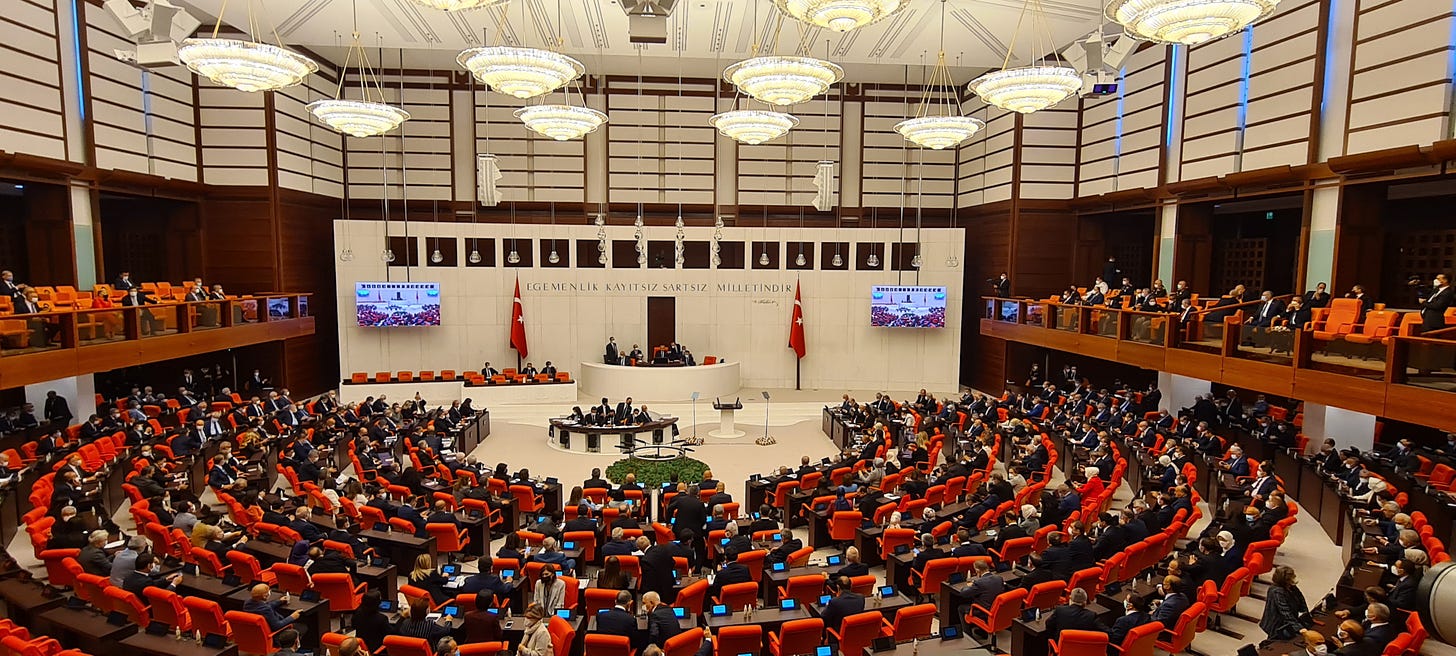Learn MMT: Currency Issuing Countries Versus Those With Full Monetary Sovereign - What’s the Difference?
Part 1 of 3: An introduction to currency issuing governments and a discussion of Argentina and Turkey as examples of countries that issue their own currency but do not have full monetary sovereignty
“Currency issuance is just the first step. Without full monetary sovereignty, a government remains vulnerable to external shocks, debt crises, and inflationary pressures that arise from obligations in foreign currencies. True sovereignty allows a government to serve its people by prioritising domestic stability and welfare over external debts.” Pavlina Tcherneva (The Case for a Job Guarantee, 2020)
I’ve mentioned the phrase ‘countries that issue their own currency’ multiple times in various MMT101 articles, as if it were the solution to all our economic ills. It’s not. While it provides a huge advantage over countries that do not issue their own currency, it is not sufficient to ensure a country has complete control over its economic policies.
In this article, I clarify the difference between the phrases ‘currency issuer’ and ‘currency sovereignty.’ And demonstrate why it is only with the latter that a country can take full control of its fiscal (i.e. spending and taxing) and monetary (i.e. interest rates) policy decisions.
There is much to say on this topic so I will discuss it across three articles. In part one I concentrate on the positives and negatives relating to those countries that lack full currency sovereignty but nonetheless issue their own currency. I use Argentina (less so) and Turkey (more so) as examples to show the opportunities and restrictions of currency issuance.
Defining Currency Issuer and Currency Sovereignty
Let’s start with concise definitions of the two phrases, ‘currency issuer’ and ‘currency sovereignty,’ acknowledging that these definitions are not intended to be comprehensive; we will build upon them throughout this article.
Currency Issuing Governments
A currency issuer is, as the phrase indicates, a country that issues its own currency. This means it can’t run out of its own currency; if there are goods and services available to purchase in that currency, it can buy them without needing to tax or borrow before spending.
Thus, a currency-issuing government can pay public sector wages, fund social programs, support healthcare, finance schools, pay for essential infrastructure, assist citizens and businesses during a crisis—such as the COVID-19 pandemic—and invest in infrastructure projects.
For example, Argentina subsidises the cost of electricity and gas for its citizens and the Turkish government helped to fund the construction of Istanbul Airport, one of the largest infrastructure projects in the world. Both of these countries issue their own currency.
Full Monetary sovereignty
Monetary sovereignty is a broader concept. It encompasses all of the above, plus full control over monetary and fiscal policy, irrespective of relationships with other countries.
To have full monetary sovereignty the following conditions must be met:
The government issues its own currency.
The government does not borrow in foreign currencies and, therefore, has little or no foreign currency debt.
The currency’s value is not pegged to another currency or commodity (i.e. the exchange rate floats).
The government—via the central bank—has full control over interest rates.
The government can spend as needed to meet domestic priorities as long as inflation is under control.
For example the US government borrows exclusively in its own currency. The US has no need to generate foreign currency to pay off foreign debt - or for that matter, any growing interest on that non-existent debt. This is a key feature of having full monetary sovereignty: the government can consider how to use the country’s resources without worrying about the need to borrow or generate foreign currency. Or, as can be the case for many currency users, the consequences of having their fiscal and monetary policies dictated by another country’s needs.
Now that we have these basic definitions, let’s explore them in more detail, starting with the advantages and potential disadvantages for currency-issuing governments— i.e. those without full monetary sovereignty."
If you’re finding value in these articles, consider becoming a paid subscriber. Your support helps me continue writing about MMT and building a community of like-minded individuals.
You are a country that issues your own currency - what can possibly go wrong?
“The key to understanding the limits of a currency-issuing government is to recognise the difference between monetary sovereignty and currency issuance. Countries that issue their own currencies but tie themselves to foreign-denominated debt are not truly sovereign. They lose control over monetary policy and, ultimately, over their economies.” Randall Wray (Modern Money Theory: A Primer on Macroeconomics for Sovereign Monetary Systems, 2012)
As I outlined earlier, countries that issue their own currency have advantages over those who don’t. They have:
The ability to fund domestic needs.
Control of tax policies: though often limited by circumstances.
Control over interest rates: though often limited by circumstances
Control of inflation: though often limited by circumstances.
Control over exchange rates: though often limited by circumstances.
1. The Ability To Fund Domestic Needs
Currency issuing governments have – as long as resources are available – the ability to fund domestic needs without having to raise money via taxes or through borrowing.
For example:
Argentina, which issues the Argentine Peso was able to fund a job guarantee programme between 2002 and 2008 that helped 2 million Argentinian citizens into work.
Turkey, which issues the lira, invested in several massive construction projects as well as reducing its reliance on foreign military equipment by developing its own defence capabilities.
In relation to Turkey: there were downsides that followed on from their defence spending: weaknesses in Turkey’s economy meant that it had to import much of what was needed to realise the expansion plans. And this lead to major economic problems - which I discuss shortly.
Contrasting Argentina’s job guarantee spending with Turkey’s defence industry spending
Argentina’s Job Guarantee Programme
In its first year, of Argentina’s job guarantee programme, (called ‘Jefes de Hogar ie.., Heads of Household, Program’) the government spent the equivalent of $11 billion USD to fund the program, i.e. approximately 1% of Argentina's GDP.
At its peak the programme provided jobs to roughly 2 million people. Those jobs were needed in response to the massive unemployment caused by the 2001–2002 economic crisis.

Orthodox economists assume that ‘excessive’ government spending (i.e. excessive deficit spending) - generates demand in the economy - and that it is this greater demand that leads to price rises because the existing supply will not be adequate to meet the increased demand. In the case of Argentina’s job guarantee project that did not happen.
MMT advocates point out that the reason that Argentina’s spending did not cause inflation, was because the government was buying something that was not in short supply, i.e. Labour. High unemployment meant that there was little competition for that labour from the private sector. The economy had unused capacity. Despite high levels of government spending the inflation predicted by orthodox economists did not materialise. This was because there was capacity of the economy to absorb that spending.
MMT argues that as long as there are idle resources, in this case, unemployed people, the government can increase spending without pushing up prices. It’s true that the Job Guarantee can set a floor on wages, and greater employment increases spending in the economy - and that increases demand - however employing previously unproductive citizens also increases the country’s capacity and output. Employing idle resources, in this case people, does not necessary lead to inflation – until full employment has been reached. What MMT advocates are saying is that, for currency issuing governments, the size of a deficit (or surplus, for that matter) is not what’s important. What matters is the impact of that spending on citizens' lives.
Clearly that is a very short summary of what is a complex story. However, for the purposes of this article, I’m using it to draw out some simple lessons relating to government spending and inflation.
Let’s contrast this with Turkey, where its spending lead to inflation, a fall in the value of the lira and a cost of living crisis for Turkey’s citizens.
If you’re finding value in these articles, become a paid subscriber. Your support allows me to continue to write, teach and to build a community of like-minded individuals—individuals, like you, who understand that MMT offers an opportunity to change the world for the better. Become a paid subscriber now.
Turkey’s defence industry
Turkey used its currency-issuing powers to fund the expansion of its defence industry. This decision boosted not only the defence industry but also led to economic growth. For example, turnover in the defence and aeronautics sector rose from $1.85 billion in 2006 to approximately $6 billion in 2016. By 2018 Turkey was the 14th largest defence exporter in the world.

That’s impresesive, however, the spending also lead to serious negative consequences: namely, inflation and a depreciation of the currency and a cost of living increase for Turkish citizens.
Orthodox economists explain this inflation by citing two main factors. Firstly, that increased government spending drove up demand for goods and services and that demand outpaced the existing supply. Secondly, existing structural issues (e.g. Turkey’s reliance on imports and its existing foreign debt) lead to a weakening of the lira: which made imports much more expensive - pushing up costs even further for businesses. In short, the spending caused increased demand, which combined with the weakening lira, resulted in spiralling inflation.
MMT advocates point out that inflation arose - not because of the spending itself - but because the country lacked the capacity to accommodate that spending. i.e. there was a limited supply of skilled labour, energy, machinery and raw materials etc. That supply was being chased by the government but also by the private sector. It was the competition for resources that pushed up prices (and the depreciating currency).
So, in this case, orthodox economists stress the demand side (increased spending), while MMT stressed the supply side, i.e. lack of existing resources. Problems occur when you spend into an economy that does not have resources that can be purchased because they are in short supply. And when something is in short supply, the price goes up as buyers compete to buy it. MMT agrees that inflation was exacerbated by the structural issues: i.e. Turkey’s need to import to meet its core needs. This pushed up Turkey’s foreign currency debt which caused further problems.
The need to service foreign debts has an impact on government policies as they need to design policies that will generate foreign currency rather than to meet their own citizens’ needs. This problem is identified by MMT economists as a major negative issue for many currency issuing governments.
Issuing your own currency is not enough to allow complete control over policy choices
Issuing your own currency–does not mean you have complete control over your economy or complete control over your own policy decisions. Often, as I mentioned above, those decisions are determined by the needs to generate foreign currency (and by the ‘global economic weather’). And that means focusing on activities that will earn that currency. For example, I discussed Turkey’s need to import energy and technology earlier and the need to pay for those in foreign currency. Those activities built up debts that had to be paid back.
The obvious question is, how do countries in that situation go about earning the currency they need to pay those debts? Which is the same as saying, how are currency issuing governments policy choices restricted by their foreign currency debt?
Turkey focused on several areas to earn foreign currency:
They invested in their tourism sector, to the extent that they now attract millions of visitors each year.
They worked to boost exports in sectors like defence (as discussed earlier) textiles and automobiles
They encouraged foreign investment in areas such as energy and manufacturing.
They encouraged Turkish workers abroad to send back money from other countries.
And they borrowed by issuing foreign-currency bonds to international investors.
It made sense for Turkey to invest in the areas of its economy that were weak, such as energy, food and technology etc because strengthening these areas–means there would be less need to import and build up foreign currency debt.
However, Turkey’s focus on building its defence industry meant a need to import machinery and energy (Turkey imports about 75-80% of its energy), and paying for this put a strain on the economy. See ‘Investigating the Nexus Between Militarization and Inflation in Turkey’. Not an MMT approach but the document gives some context to Turkey’s militarisation and inflation.
2. Limited control of tax policies
I will discuss taxes in more detail in a separate article. However, it’s important, in this context, to understand both the power and the limits to tax policy for countries that issue their own currency: so this is just a summary of some of the issues involved.
Currency issuing governments can spend into the economy but they can also retire currency out of the economy by collecting taxes. MMT advocates point out that this gives such countries the ability to use tax in a number of different ways: as a policy tool; as a way to reduce or entrench inequality and as a way to encourage/discourage certain behaviours. I cover each of these areas briefly below.
2.1 Tax as a policy tool
MMT views spending and taxing (i.e. fiscal policy) as the most powerful policy tool governments have: more so than monetary policy (i.e. raising and lowering interest rates).
For example, taxes can be used to free up capacity in the private sector, allowing for additional government spending. Resources that would have been purchased by the private sector can now be purchased by the government.
Taxes take money directly out of private sector bank accounts, which means less money for citizens and businesses to spend. When they are spending less, they are using less resources and employing less people. So, if the government wants to build a power station, or a new school or a bridge, it can employ those workers: workers that are no longer employed by the private sector. And they can purchase the raw materials that would otherwise have been put to use by the private sector to build offices, houses, factories or make more widgets.
In certain areas Turkey could have used its tax powers to free up some of the resources it needed when investing in its defence industry. This may have dampened the price increases that resulted from Turkey spending into an economy that did not have the capacity to absorb that spending.
2.2 Taxes as a way to reduce or entrench inequality
Taxes can also be used in a progressive way, i.e. to lessen inequality: taking less from poorer citizens and more from the wealthy.
Taxes can be used to reduce the concentration of wealth and promote a fairer society.
Progressive tax policies can include higher taxes on capital gains, luxury goods, and inheritances. Such policies not only reduce inequality but also manage inflation by withdrawing excess demand from the economy by preventing the wealthy from accumulating too much purchasing power.
Progressive taxes could have been used by Turkey not only to remove some private sector demand but also to help with the cost of living crisis for those on lower incomes.
2.3 Taxes as a way to incentivise or inhibit certain behaviours.
Taxes can be used to incentivise desired behaviours, such as offering tax breaks for renewable energy use, or inhibit undesirable actions, like imposing higher taxes on tobacco or carbon emissions.
Turkey could offer tax breaks or credits to industries outside of defence, such as export-driven sectors, encouraging investment in areas that generate foreign currency or provide critical goods domestically. And it could impose higher taxes on luxury goods to discourage consumption of those goods, freeing up foreign currency reserves for essential imports, like energy.
It could also have given tax breaks to areas such as renewable energy to develop areas that would reduce the need to import energy from other countries.
Turkey did not primarily focus on these types of tax policies to mitigate the issues it was having while building up its defence industry. Instead, Turkey pursued monetary adjustments and austerity measures.
MMT advocates are in favour of fiscal policy as the government’s main lever (taxing and spending) over monetary policy (interest rates) and view interest rates as a much more blunt instrument. MMT views austerity as a way to depress rather than grow the economy, as it takes money out of the private sector rather than investing into the sector. Governments focussed on ‘reducing the deficit’ are blind to the other side of that account: - when the government is in deficit that means the private sector is in surplus. If the government persues a surplus that means that it is the private sector that will be in deficit. And that means less money in the private sector, less investment, less growth and ultimately, less tax for the government. The deficit will re-appear as the private sector goes into recession, the tax take falls and welfare support costs lead to higher government spending.
Without full monetary sovereignty policies related to tax can be limited by ecomomic circumstances, both domestic and foreign
When a country has debt denominated in a foreign currency it may need to tailor its tax policies to favour certain sectors or businesses. In Turkey, that meant encouraging the tourism sector (among other things), in order to bring in significant amounts of foreign currency.
For Argentina, it meant imposing high export taxes on commodities like soybeans sold to international buyers. With the expectation that these buyers pay in, much-needed, foreign currencies (typically U.S. dollars or euros). So the government uses the high export taxes as a way to capture a portion of that foreign currency. It can then use the foreign currency to pay down debts in that currency.
Related policies could inlude reducing VAT on tourist related services, offering tax breaks to tourist related business and allowing duty free shopping.
The point here is that circumstances shape tax policies. Governments without full monetary sovereignty are not free to set their tax polices purely based on the needs of their citizens…
To be continued in Part 2 of, ‘MMT Fundamentals - Currency Issuing countries Versus Those With Full Monetary Sovereignty’
Due to limits on email length, I will discuss this topic over three articles rather than try to cram everything into one. In part two, I will conclude my discussion of currency issuing governments and in part three I will outline the advantages countries with full currency sovereignty have over those that have currency issuence without full monetary sovereignty.
Resources
Turkish government helped to fund the construction of Istanbul Airport
By 2018 Turkey was the 14th largest defence exporter in the world
Argentine Peso was able to fund a job guarantee programme between 2002 and 2008
Turkey, which issues the lira, invested in several massive construction projects
‘Investigating the Nexus Between Militarization and Inflation in Turkey’.
Subscribe now to learn how together we can make the economy work for citizens and the planet.
Jim Byrne - MM101.ORG
Links to some of my most popular newsletters
Become a paid subscribers for access to additional content:
A Permanent Home for MMT101 Paid Subscriber Resources – Factsheets, book recommendations, academic papers, MMT podcasts and more.
MMT Factsheet 3: If Taxes Are Not For Spending What Are They For?
Support MMT101.org by Becoming a Paid Subscriber
If you are enjoying these articles and find them useful as part of your Modern Monetary Theory (MMT) education, please support MMT101.ORG—if you can—via small donation. $5 (or the equivalent in your own currency—SubStack uses US dollars) will allow me to continue this work and reach & teach more people. If you can’t do that, consider sharing the articles and podcasts. By subscribing and supporting, not only will you learn how the economy works, but you will also be part of the efforts to change people’s lives for the better. I do not have the power to do that alone, but as an ever-expanding group who understand that there is a better way, we can make a difference.
Thanks,
Jim
Subscribe now to learn how we can make the economy work for citizens and the planet.











All partial systemic reforms ignite the law of unforeseen consequences. The issuance of debt-free money by the U.S. Treasury solves a major problem. The federal government no longer needs to borrow in order to spend, but this reform does not diminish the underlying cause of increases in prices of land, other natural assets (e.g., frequencies on the broadcast spectrum, any asset with an inelastic supply) or commerce influenced by competition-limiting licenses. These markets can be tamed only by the public capture of economic rent.
Treasury-issued dollars can be used to retire all government securities as they mature. Calling the bonds would be too disruptive. The Federal Reserve Banks could be required to cancel and destroy the government security debt recorded as assets on their balance sheets. Why not, since the money loaned to the government was created out of thin air. Commercial and savings banks can return to their proper role as financial intermediaries that must have money deposits in order to make loans. So far so good.
We need a thorough examination of the chain reaction of outcomes that will occur and come up with a comprehensive (if incremental) plan for systemic reform.
Edward J. Dodson, M.L.A.